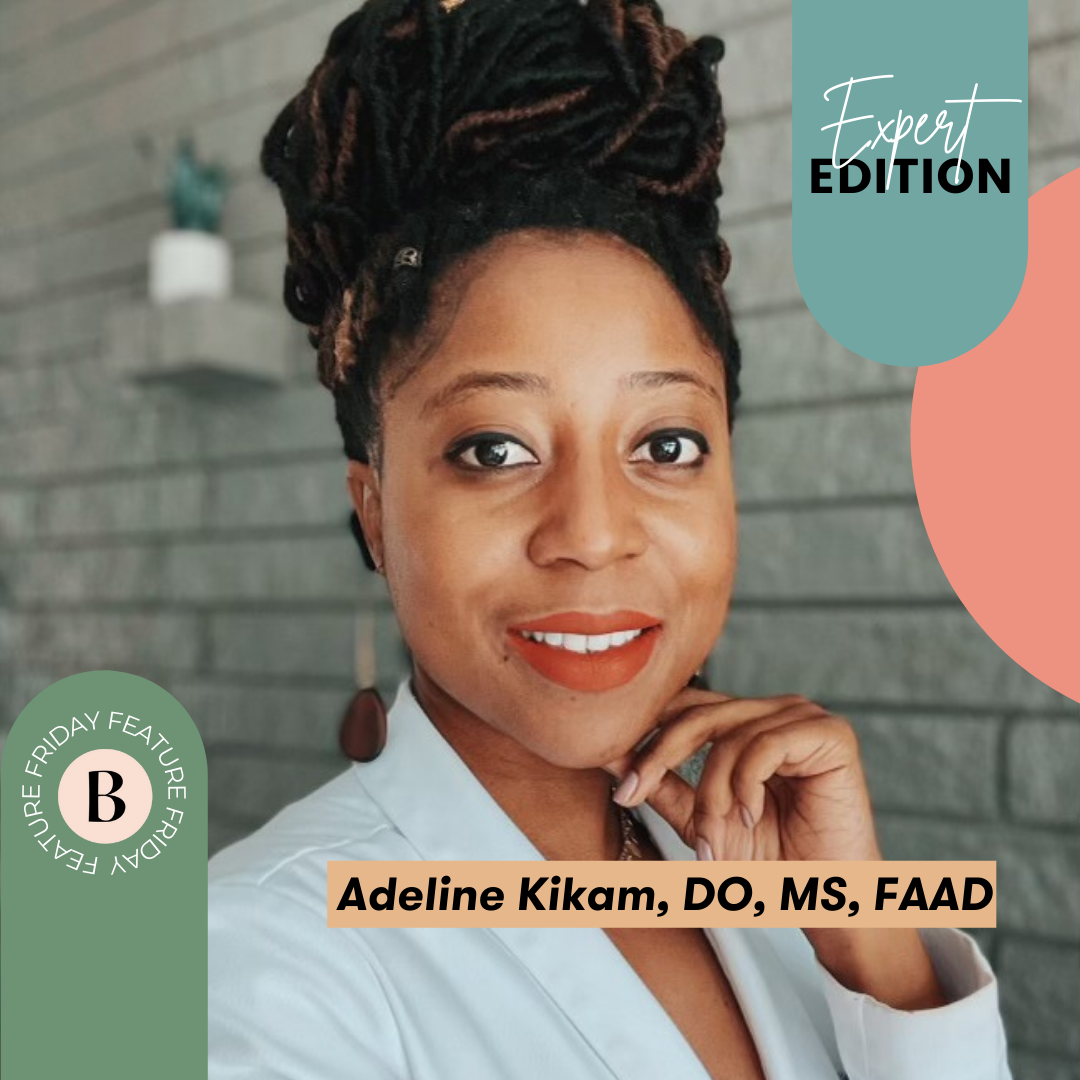We all know that our mental health can affect us in many different ways. BFT is excited to dedicate the next several Fridays to feature experts to discuss how mental health can affect their respective fields.
To kick us off, we chatted with Dr. Adeline Kikam, DO, MS, FAAD, a Board Certified Dermatologist and Skin of Color Advocate and Educator. She's the founder of @brownskinderm, a platform dedicated to skincare and dermatologic health education for all skin types, especially skin of color.
1. Skin issues can affect self-esteem tremendously, what would you say is the most important thing to keep our skin in check?
The most important thing is to have a positive mindset about our skin and realizing there is no such thing as perfect skin. That reduces the pressures we put on ourselves to always have seeming perfect skin which does not exist. At the same we need to make sure we are investing time in the care of our skin health. Afterall, our skin is the largest organ in the body and our first line of defence against outward macro and micro assault. Use daily sun protection, perform self skin checks and once a year, have a dermatologist look you over from head to toe.
2. When purchasing products, is expensive always better? What are some inexpensive alternatives?
Expensive doesn't always mean better however, skincare products considered medical grade or cosmeceuticals tend to be more effective and on the expensive side compared to drugstore brands because they tend to use more high grade and concentration of active ingredients.
3. What should black women incorporate in their skincare routine in their:
20s:
In your 20s the focus should be on preventative skin care especially starting in your mid 20s. Sun protection, antioxidants like vitamin c and retinoids are ery important in delaying signs of aging and also preventing hyperpigmentation, a major concern in highly pigmented or darker skin types.
30s:
In your 30s, continue with preventative skincare but also incorporate targeted underlining treatment with products to address developing issues in skin. It may be things like hyperpigmentation, or even adult breakouts.
40s:
Skin metabolism is a lot slower in your 40s compared to your 20s. I am a big proponent of exfoliation for mature skin. It helps with skin cell turnover, refines skin texture and brightens skin tone. In your 40s, you have to continue with preventative and targeted treatments as well but you want to make sure you are using skincare products that have ingredients at higher therapeutic concentrations or even prescription strength products to really address the level of damage you witness at this age and efficacy. For example, using a prescription retinoid over an over the counter retinol which will take months to yield results. You want to incorporate products that replenish moisture such hyaluronic acid in skin as moisture tends to decrease with age leading to dry dehydrated skin.
4. We know that our mood can affect our skin. Do you have any advice for chronic hair-pulling (trichotillomania)?
Tiricholiomania is a condition that involves compulsive hair pulling for various physiological reasons. Getting to the root cause of what those issues are is usually helpful in stopping the behaviour.
5. Circling back to our self-esteem, there's a saying that "when we look good, we feel good". When it comes to wearing make-up, are their certain products that black women should avoid?
In general with makeup, making sure products are non comedogenic is important as such can lead to breakouts. Ingredients to look out for in makeup include dyes, fragrances and lanolin to name a few. If you have sensitive or allergy prone skin, then go for mineral based makeup products.
6. Do you recommend any foods that are good for our skin and mental health?
I think one should strive for a healthy balanced diet of fruits, vegetables and nuts which go a long way in making sure we are getting the essential nutrients for our body in general for our body and mind. Another very important, often overlooked but important factor to our mental and physical health is sleep and it’s importance can’t be overstated.
7. Since the pandemic, a lot of people are working from home and becoming burned out way faster with heightened levels of anxiety. Is it okay to skip our day or nighttime skincare routine?
Life happens so it’s not a big deal if you miss not doing your night time routine here and then but try to make sure it's not a habit because going to bed with an unclean face consistently can lead to breakouts, dryness, and irritant dermatitis.
8. How does our mind affect our skin?
The state of our mind is tied to our overall mental health. Things that cause stress and depression can lead to elevation in stress hormone, cortisol which puts the body in a state of hyper inflammation and leads to breakouts on the body, as well as accelerates signs of aging.



